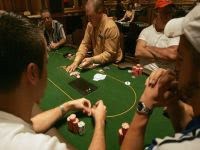The Cheating brain
The decision to cheat someone comes from a specific area of the brain, says study
From an experiment that examined the brains of poker players during games, researchers identified the specific area that operates in situations of cheating.
Science of Poker: researchers found that a single brain region deals with specific information about decisions taken against each other...
Many areas of the brain deal with social tasks, but scientists at Duke University have identified one that acts specifically on the way to act when we meet with an opponent and think about deceiving them, according to an article published on Thursday (5th) in journal, Science.
Social interactions cause the brain to operate under different rules and can influence decision making, the article notes.
In recent years, neuroscientists have found that people rarely make decisions in isolation because they are sensitive to what other people want and expect.
"One phone call and a quick conversation with the mother or a friend can make us think twice before making a decision, and can give us the courage to go ahead with a plan," he adds.
Scott Huettel and colleagues at the Interdisciplinary Center for the Science of Decisions at Duke (North Carolina) have developed an experiment in which the participants, who were ordinary people with no experience in poker, played virtual games against a human and a computer.
Participants played by a device connected to a functional magnetic resonance image (MRIf) and by computer algorithms. The researchers scanned 55 brain regions, and could observe the amount of information processed by each brain area.
The researchers found that a single brain region, the conjunction of temporal and parietal (CTP), deals with the specific information about decisions taken against another human.
The CTP is an area at the rear end of the brain and the lateral groove, where the temporal and parietal lobes are located, and that, according to scientists, plays a crucial role in the processes of differentiation between "me and others."
Some experiments have shown that electrical stimulation of CTP can cause body experiences, and the electromagnetic disturbances in this area affect the individual's capacity for making moral decisions.
In some experiences during poker games at Duke, participants received an obviously weak "hand" of cards, and the researchers observed how the player thought to deceive his opponent.
The signals from the brain, captured by MRIf indicated to scientists when the participant was thinking of bluffing the opponent when they were considered a good poker player. But when the participant was playing against a computer, the signals from the CTP did not indicate that they were making decisions.
The study's principal investigator, McKell Carter, indicated that the CTP is a border area in the brain and may be at the intersection where they can gather information from biological and attention information.
Before the game started, the participants presented themselves and shook hands with their human opponents. In general, according to Carter, participants paid more attention to the human opponent than the computer, which is consistent with the human impulse of social behavior.
"There are fundamental differences between neural decisions taken in a social context and a non-social one," said Huettel, lead author of the article.
"Social information can cause your brain to play with different rules than you would in a non-social situation," he added. "It is important that both scientists and politicians understand what causes us to look at a situation in a social or non-social way," he added.
Translated from the Portuguese version by:
Lisa Karpova
Pravda.Ru

Subscribe to Pravda.Ru Telegram channel, Facebook, RSS!




